| Listing 1 - 10 of 43 | << page >> |
Sort by
|
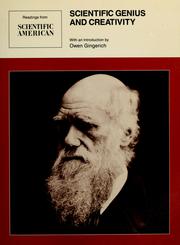
ISBN: 0716718588 Year: 1982 Publisher: New York, NY ; Oxford : W. H. Freeman,
Abstract | Keywords | Export | Availability | Bookmark
 Loading...
Loading...Choose an application
- Reference Manager
- EndNote
- RefWorks (Direct export to RefWorks)
Creative ability in science --- Scientists --- Scientific creativity --- Science --- Biography --- Methodology
Book
ISBN: 1803550341 Year: 2022 Publisher: London : IntechOpen,
Abstract | Keywords | Export | Availability | Bookmark
 Loading...
Loading...Choose an application
- Reference Manager
- EndNote
- RefWorks (Direct export to RefWorks)
What is creativity? There are many definitions, many of which involve trying different experiences, searching for new solutions, exercising our brains, and meeting and talking with new people. To be creative we need to believe in our skills and step outside our comfort zones in the search for new challenges. This book is a discussion of creativity in four parts: creativity behaviour, creativity learning, creativity in science and arts, and creativity tendencies. Chapters address such topics as creativity in children, creativity in education, creativity at the emotional level, and more.
Creative ability in science. --- Scientific creativity --- Science --- Methodology
Book
ISBN: 1299224024 1599474301 9781599474304 9781599474267 1599474263 9781299224025 Year: 2013 Publisher: West Conshohocken, Pennsylvania Templeton Press
Abstract | Keywords | Export | Availability | Bookmark
 Loading...
Loading...Choose an application
- Reference Manager
- EndNote
- RefWorks (Direct export to RefWorks)
In the evolution of science and technology, laws governing exceptional creativity and innovation have yet to be discovered. The historian Thomas Kuhn, in his influential study The Structure of Scientific Revolutions, noted that the final stage in a scientific breakthrough such as Albert Einstein's theory of relativity-that is, the most crucial stage-was "inscrutable." The same is still true half a century later. Yet, there has been considerable progress in understanding many of the stages and facets of exceptional creativity and innovation. In Exceptional C
Creative ability in science. --- Creative ability in technology. --- Scientific creativity --- Science --- Technical creativity --- Technology --- Methodology
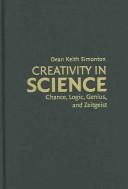
ISBN: 052154369X 0521835798 1139165356 Year: 2004 Publisher: Cambridge Cambridge University Press
Abstract | Keywords | Export | Availability | Bookmark
 Loading...
Loading...Choose an application
- Reference Manager
- EndNote
- RefWorks (Direct export to RefWorks)
Psychologists, sociologists, philosophers, historians - and even scientists themselves - have often tried to decipher the basis for creativity in science. Some have attributed creativity to a special logic, the so-called scientific method, whereas others have pointed to the inspirations of genius or to the inevitable workings of the zeitgeist. Finally, some have viewed scientific breakthroughs as the product of chance, as witnessed in the numerous episodes of serendipity. Too often these four alternative interpretations are seen as mutually exclusive. Yet the central thesis of this book is that the chance, logic, genius, and zeitgeist perspectives can be integrated into a single coherent theory of creativity in science. But for this integration to succeed, change must be elevated to the status of primary cause. Logic, genius and the zeitgeist still have significant roles to play but mainly operate insofar as they enhance, or constrain the operation of a chance combinatorial process.
Creative ability in science. --- Health Sciences --- Psychiatry & Psychology --- Scientific creativity --- Science --- Methodology --- Philosophy of science --- Industrial psychology
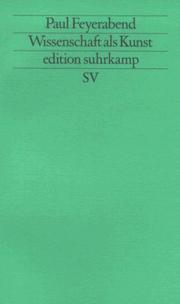
ISBN: 3518112317 Year: 1984 Publisher: Frankfurt am Main : Suhrkamp,
Abstract | Keywords | Export | Availability | Bookmark
 Loading...
Loading...Choose an application
- Reference Manager
- EndNote
- RefWorks (Direct export to RefWorks)
Creative ability in science --- Art and science --- Science and art --- Science --- Scientific creativity --- Methodology --- Art and science. --- Creative ability in science.
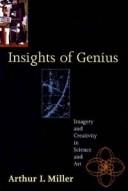
ISBN: 026228734X 058529609X 9780262287340 9780585296098 0262631997 9780262631990 Year: 2000 Publisher: Cambridge, Mass. MIT Press
Abstract | Keywords | Export | Availability | Bookmark
 Loading...
Loading...Choose an application
- Reference Manager
- EndNote
- RefWorks (Direct export to RefWorks)
"How can new knowledge be created from already existing knowledge? Insights of Genius shows how seeing in all it's many forms - insight, revelation, a distinctive point of view - is central to the greatest advances of the human intellect. Artists and scientists alike rely on visual representations of worlds both visible and invisible"--Page 4 of cover.
Physics --- Science --- Creative ability in science. --- Creative ability in science --- Physical Sciences & Mathematics --- Physics - General --- Methodology. --- Methodology --- Scientific creativity --- Scientific method --- Logic, Symbolic and mathematical
Book
ISBN: 1621985806 1283427834 9786613427830 0199892601 9781621985808 9781283427838 9780199892600 0199892598 9780199892594 6613427837 0199929955 9780199929955 Year: 2012 Publisher: Oxford New York, N.Y. Oxford University Press, USA
Abstract | Keywords | Export | Availability | Bookmark
 Loading...
Loading...Choose an application
- Reference Manager
- EndNote
- RefWorks (Direct export to RefWorks)
Whether you are a student or an established scientist, researcher, or engineer, you can learn to be more innovative. In Innovation Generation, internationally renowned physician and scientist Roberta Ness provides all the tools you need to cast aside your habitual ways of navigating the every-day world and to think ""outside the box."" Based on an extraordinarily successful program at the University of Texas, this book provides proven techniques to expand your ability to generate original ideas. These tools include analogy, expanding assumptions, pulling questions apart, changing your point of
Creative ability in science. --- Science --- Creative thinking --- Creative thinking (Education) --- Creative ability --- Thought and thinking --- Science education --- Scientific education --- Scientific creativity --- Study and teaching. --- Methodology
Book
ISBN: 0199361436 0199361428 9780199361427 019936141X 9780199361410 9780199361410 Year: 2015 Publisher: Oxford [England] New York, New York
Abstract | Keywords | Export | Availability | Bookmark
 Loading...
Loading...Choose an application
- Reference Manager
- EndNote
- RefWorks (Direct export to RefWorks)
For evolutionary biologists, the concept of chance has always played a significant role in the formation of evolutionary theory. As far back as Greek antiquity, chance and ""luck"" were understood to be key factors in the evolution of the natural world. Emphasizing chance is an entire way of thinking about nature, and it is also one of the key ideas that separates Charles Darwin from other systematic biologists of his time. Studying the concept of chance in Darwin's writing reveals core ideas in his theory of evolution, as well as his reflections on design, purpose, and randomness in nature's progression over the course of history.In Darwin's Dice: The Idea of Chance in the Thought of Charles Darwin, Curtis Johnson examines Darwin's early notebooks, his collected correspondence (now in 19 volumes), and most of his published writing to trace the evolution of his ideas about chance in evolution. This proved to be one of Darwin's most controversial ideas among his reading public, so much so that it drew hostile reactions even from Darwin's scientific friends, not to mention the more general reader. The firestorm of criticism forced Darwin to forge a retreat, not in terms of removing chance from his theory--his commitment to it was unshakable--but in terms of how he chose to present his theory. Briefly, by changing his wording and by introducing metaphors and images (the stone-house metaphor, the evolution of giraffes, and others), Darwin succeeded in making his ideas seem less threatening than before without actually changing his views. Randomness remained a focal point for Darwin throughout his life. Through the lens of randomness, Johnson reveals implications of Darwin's views for religion, free will, and moral theory. Darwin's Dice presents a new way to look at Darwinist thought and the writings of Charles Darwin.
Serendipity in science. --- Creative ability in science. --- Scientific creativity --- Science --- Chance in science --- Scientific serendipity --- Methodology --- Darwin, Charles, --- Darwin, Charles, Robert --- Psychology.
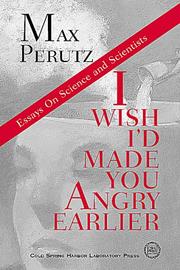
ISBN: 0879695242 9780879695248 Year: 1998 Publisher: Cold Spring Harbor Cold Spring Harbor Laboratory Press
Abstract | Keywords | Export | Availability | Bookmark
 Loading...
Loading...Choose an application
- Reference Manager
- EndNote
- RefWorks (Direct export to RefWorks)
Philosophy of science --- Science --- Scientists --- Creative ability in science --- Philosophy --- Social aspects --- 5 <09> --- Geschiedenis van wiskunde en natuurwetenschappen --- 5 <09> Geschiedenis van wiskunde en natuurwetenschappen --- Professional employees --- Normal science --- Scientific creativity --- Methodology --- Social aspects. --- Science - Philosophy --- Scientists - Social aspects
Book
ISBN: 9780262141055 0262141051 Year: 2008 Publisher: Cambridge (Mass.): MIT Press,
Abstract | Keywords | Export | Availability | Bookmark
 Loading...
Loading...Choose an application
- Reference Manager
- EndNote
- RefWorks (Direct export to RefWorks)
Philosophy of science --- Creative ability in science. --- Model-based reasoning. --- Discoveries in science. --- Creative ability in science --- Discoveries in science --- Model-based reasoning --- Reasoning --- Breakthroughs, Scientific --- Discoveries, Scientific --- Scientific breakthroughs --- Scientific discoveries --- Research --- Scientific creativity --- Science --- Methodology
| Listing 1 - 10 of 43 | << page >> |
Sort by
|

 Search
Search Feedback
Feedback About UniCat
About UniCat  Help
Help News
News